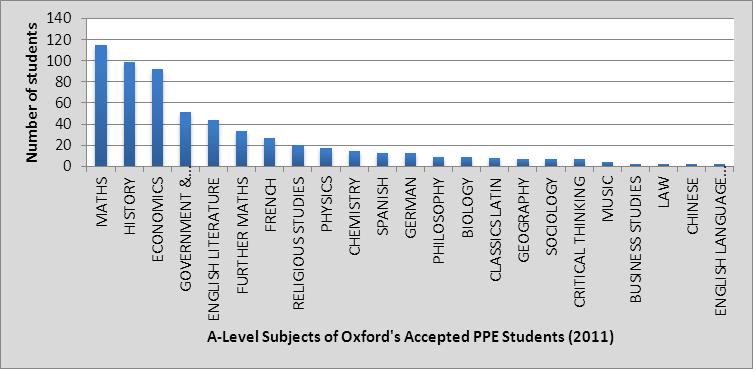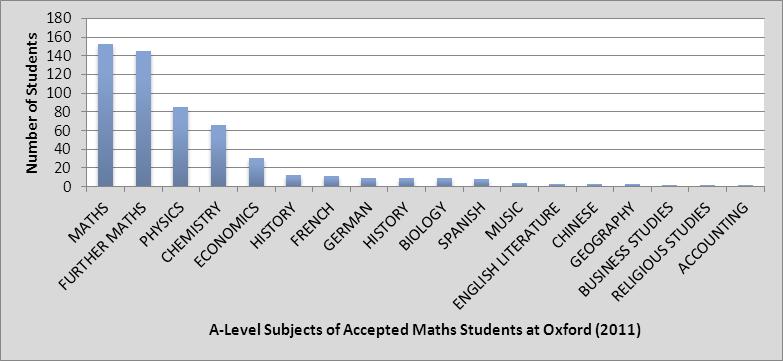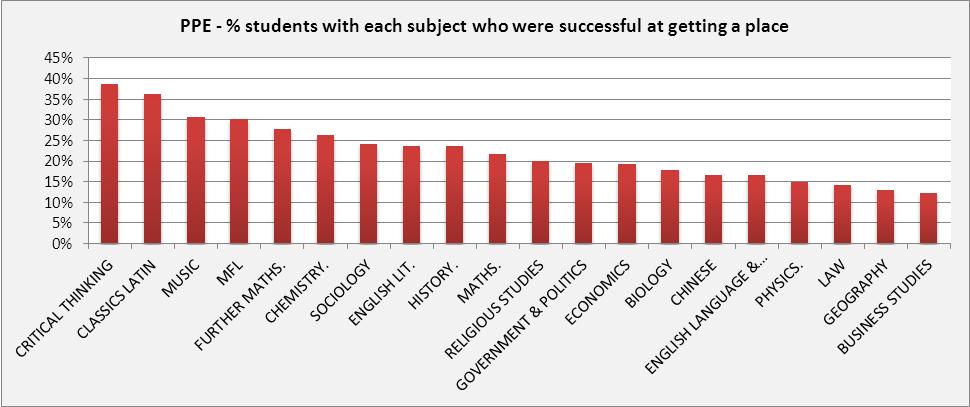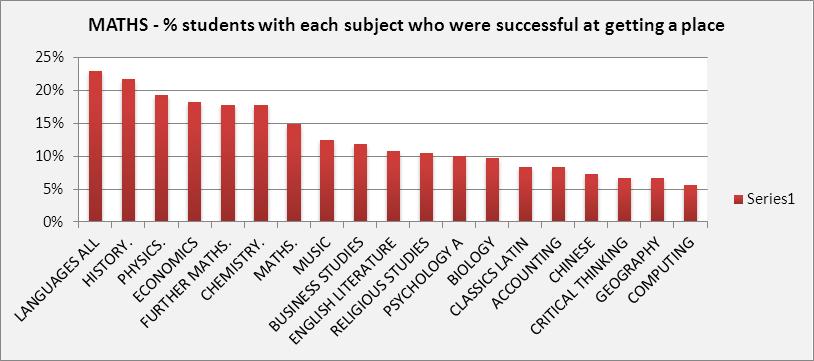The A-Levels That Make You Successful At Oxford? : Maths & PPE
3rd March 2013
This preference was originally highlighted in a 2008 Policy Exchange booklet: The Hard Truth About Soft Subjects . The booklet is free, clearly written and confidently asserts that “the vast majority of leading research universities are admitting fewer ‘soft’ A-levels and more traditional A-levels in comparison with the national uptake of these subjects”. The report supports the view with hard numbers, but these tend to be about how many students do a subject, e.g. Maths vs. Tourism. But treating data in this way ignores that not everyone with, say, ‘tourism’ would apply to university – it may be that many of those students go on to work, BTEC Level 4s, etc.
The truly important question needed to support the premise of the EBacc’s implementation is whether or not doing an allegedly ‘soft’ A-Level actually does affect your chance of getting into a ‘top university’ if you apply.
So I sent a Freedom of Information request to Oxford University asking for the A-Levels taken by all applicants, and ‘successful’ applicants, for two courses in 2011: Maths and PPE. Maths because Liz Truss has talked endlessly about it, and PPE because I wanted to look at a subject without a ‘fixed’ requirement (e.g. for Maths you need Maths, for PPE there’s no set requirement). In my head it was good because you had one very traditional and one not-so-traditional, but on reflection I wish I’d asked for Medicine or Law and that’s something I’ll likely look at in the future.
Results
Analysing the frequency of A-Level subjects of successful students in 2011, Policy Exchange’s theories are correct. Traditional subjects feature most strongly. Predictably every Maths entrant had Maths A-Level (and most Further Maths), in PPE Maths & History were also strong.
But are the numbers merely a function of more students studying those on the left at higher rates ? (i.e. Maths is the second most popular subject in the country). Or are more people with those subjects simply applying to Oxford?
So next I analysed the percentage of applicants with a particular A-Level got a place for PPE or Maths.This means that in the graph below people with A-Level subjects on the left were admitted at higher rates than subjects on the right.
So, based on numbers of applicants with each subject, people with ‘Critical Thinking’ and ‘Music’ A-Levels had among the highest acceptance rates, and Sociology had a higher rate than English Literature, Maths, History or Biology – even though none of those three subjects is an ABacc ‘facilitating’ subject.
As predicted by Policy Exchange, applicants with Law or Business Studies A-Level had a much lower success rate but it was very similar to Geography’s success rate. And Geography is a facilitating subject, whereas Business and Law are designated as ‘soft’ in the Hard Truths booklet.
For Maths things were expectedly more traditional. (Remember subjects to the left have higher success rates – i.e. were more ‘preferred’ – than subjects to the right):
This time Economics and Music (non-EBacc) are toward the left hand ‘preferred; side. Business Studies and Psychology (non-EBacc) are towards the middle, and Geography, again, is toward the right-hand ‘non-preference’ end (Even though it is in the EBacc).
SOME REALLY BIG CAVEATS
Some subjects are prerequisites. On the basis of the Maths graph don’t look at it and assume that doing Languages, History & Physics will give you the best chance of studying Maths. If you look at the first Maths graph, Maths is so popular because everyone on the course has to have it (and most have Further Maths too – 98%). These subjects are therefore prerequisites. After that, however, several non-facilitating subjects were accepted at higher rates than other ‘facilitating’ ones suggesting these subjects give an ‘edge’ beyond just having Maths & Further Maths (as per almost every other applicant).
Interaction effects are involved. It’s highly likely that combinations of subjects matter to overall success, i.e. it might be that for PPE if you study Maths or History A-Level, then after that any subject gives a roughly equal chance of getting in. If so then there’s a good case for labeling Maths & History as ‘facilitating’, but may be less so of Geography or Biology. I would love to calculate these effects across a university – or even several. It would take a while but happy to do it. Unfortunately keeping within FOI requirements meant I could only ask for small amounts of non-participant level data to maximize my chance of getting it and reduce the taxpayer burden. If anyone has access to any more specific data, however, I am very willing to work on it and see what we find.
These are tiny numbers. Of all the people who currently take Maths A-Levels in the UK, less than 0.2% of them end up at Oxford. Policies about Maths based on Oxbridge affect a tiny proportion of people. They really cannot be the main driver of political decision-making.
What’s left to know?
A lot. Do Medicine & Law have similar profiles? What are the split downs of success rates between comprehensive, grammar and independent students? What’s the influence of subject choice on degree outcomes? (I.e. Do people doing facilitating subjects really do better in their degrees?)
Like Gove & Truss, and Policy Exchange, I am absolutely in favour of giving students as much information to support their decision-making processes. Given that, we need to commit to doing it properly, based on a wide-range of data. What’s been seen here is a tiny scratch at the surface and it must be only the start. As I’ve said all along, prejudice alone shouldn’t be what we go on – there’s simply no need.
The original data sent by Oxford can be downloaded from here. For the sake of simplicity in my analysis I calculated only subjects for which any participant was accepted and I blended different exam boards into one holistic subject (e.g. History A and History B into ‘History’, or many languages into ‘MFL’), these subjects are represented in the graphs with a dot at the end of the subject name.





Comments